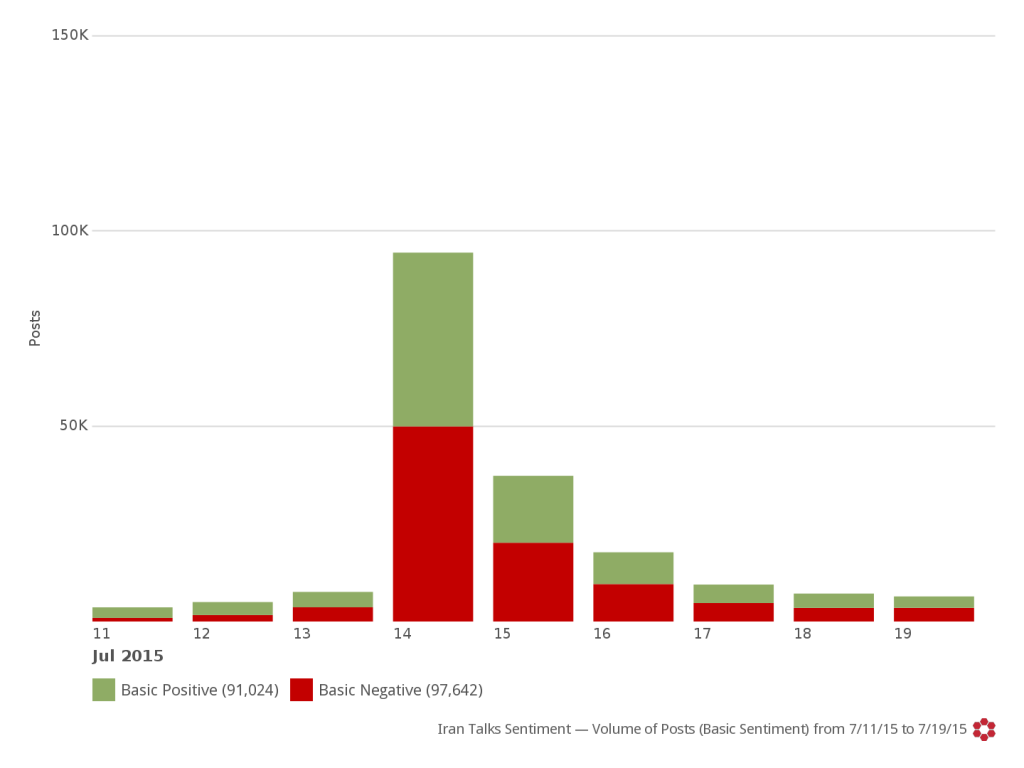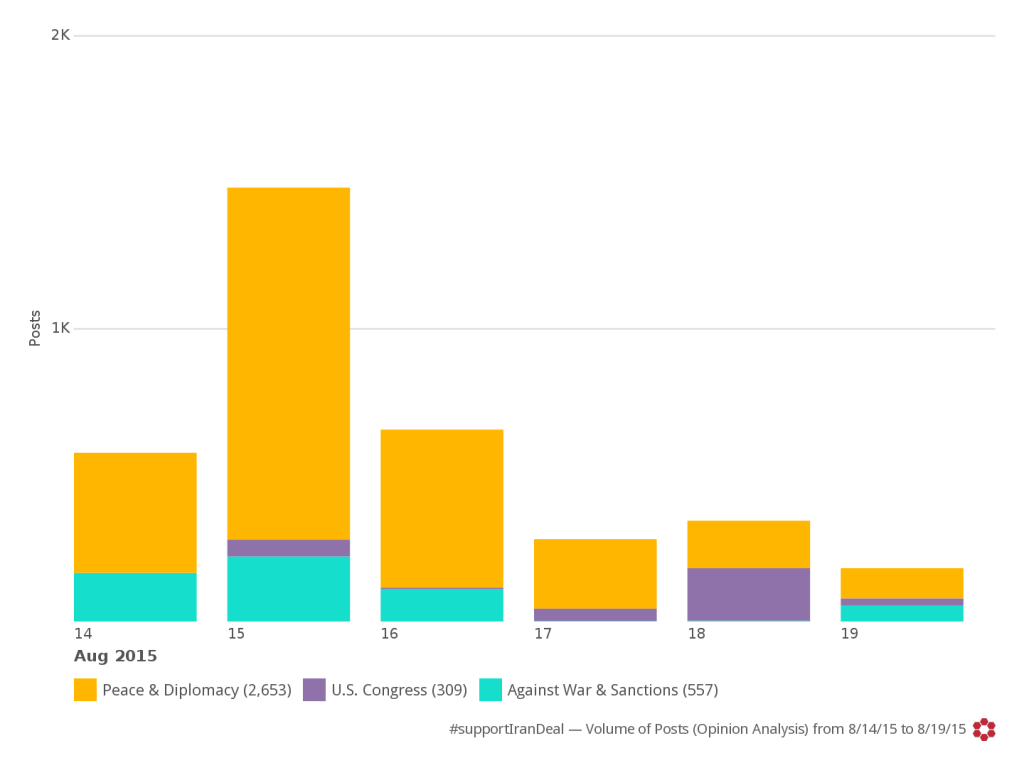International Responses to the Iran Deal
On June 14, 2015 Iran and P5+1 signed a historic deal for the Joint Comprehensive Plan of Action (JCPOA), a comprehensive agreement on the nuclear program of Iran.
The JCPOA is the cumulation of 20 months of strenuous negotiations. Parliamentarians on both Iranian and U.S. sides have been split between opposing hardliners and supporters (see Majlis Monitor’s timeline of the negotiations, which highlights parliamentary responses from both Iranian and U.S. sides).
After several extensions, expectations were running high for a deal from inside Iran and in the international community. Meanwhile, others voiced their skepticism of agreeing to any deal with the Islamic Republic of Iran.
Analyzing Social Media Responses
Conversation about the deal increased on social media as the deal began gaining more global attention.
To capture the general online sentiment around the deal, Majlis Monitoranalyzed Twitter data using Crimson Hexagon’s social media analytics platform. We looked at data from a month leading up to the deal and saw that there is 744,725 mentions of the deal on Twitter. After disregarding for neutral tweets such as news stories and live updates, we looked at mentions of the deal in the days leading up to the agreement and several days after:
In the days leading up to the deal, the sentiment was mostly positive. Yet, on the day that Iran and P5+1 reached the JCPOA, the sentiment was slightly more negative with 49,940 Tweets in comparison to 44,491 positive Tweets. In the days after the JCPOA was reached, there were fluctuations between slightly positive and slightly negative overall sentiments, indicating a generally split opinion.
#SupportIranDeal Campaign’s Online Conversation
Shortly after, in light of the U.S. congress 60 day review period, an international campaign to support the deal emerged, where the Iranian diaspora and the international community came together and voiced their support of the deal. #SupportIranDeal began to trend, and the online conversation was interestingly “peaceful”:
#SupportIranDeal campaigners used the word “peace” quite often, and other sentiments of international support were commonly affiliated with being against “war” and “sanctions”. It seems that the campaign is primarily focused on associating the deal with peaceful intentions, while others support out of concern for avoiding war and sanctions.
So far, the campaign has also engaged in waves of direct communication with U.S. House of Representatives, like on August 18th, which brings about an element of online crowdsourcing of “lobbying” efforts.
In the upcoming weeks, it will be interesting to see if the #SupportIranDeal campaign will turn into an example of how social media platforms and online resources in general, can counter costly traditional lobbying efforts.
The JCPOA and Iran’s Majlis
While the international community anticipates the decision of the U.S. Congress, Iran’s Majlis is demanding a stronger say on the deal. Unlike the U.S. Congress, it is not yet clear the extent of influence that Iran’s Majlis will have over the deal. Formal oversight of the accord rests with Iran’s powerful committee, the Supreme National Security Council (SNSC), which is headed by President Hassan Rouhani.
Ali Akbar Salehi, the head of Iran’s Atomic Energy Agency stated that “it is absolutely not the case that the government must bring before parliament any agreement it wants to sign with a foreign country”.
“The JCPOA is not a treaty or a convention, and I don’t know under what definition it would go to parliament”, Salehi was quoted as saying by Iran’s state news agency IRNA.
Ali Shamkhani, the secretary of the Iranian Supreme National Security Council (SNSC), indicated on August 20, 2015 that the SNSC has nearly finished examining the deal, but will not announce their conclusion before the U.S. Congress does.
Meanwhile, the Iranian Parliament has created an ad hoc committee tasked with reviewing the deal. The committee of 15 members, who were among 24 other lawmakers volunteering to be members of the committee, were elected through voting by Iran’s MPs on August 19, 2015. Iran’s parliament may then vote on approving or rejecting the deal, which will likely be in October after the review by the U.S. Congress.
Currently, the fate of the nuclear deal on the U.S. and Iranian sides is unclear, but international responses to the deal have demonstrated that parliamentarians on both sides are not alone in wanting a say on the deal.

